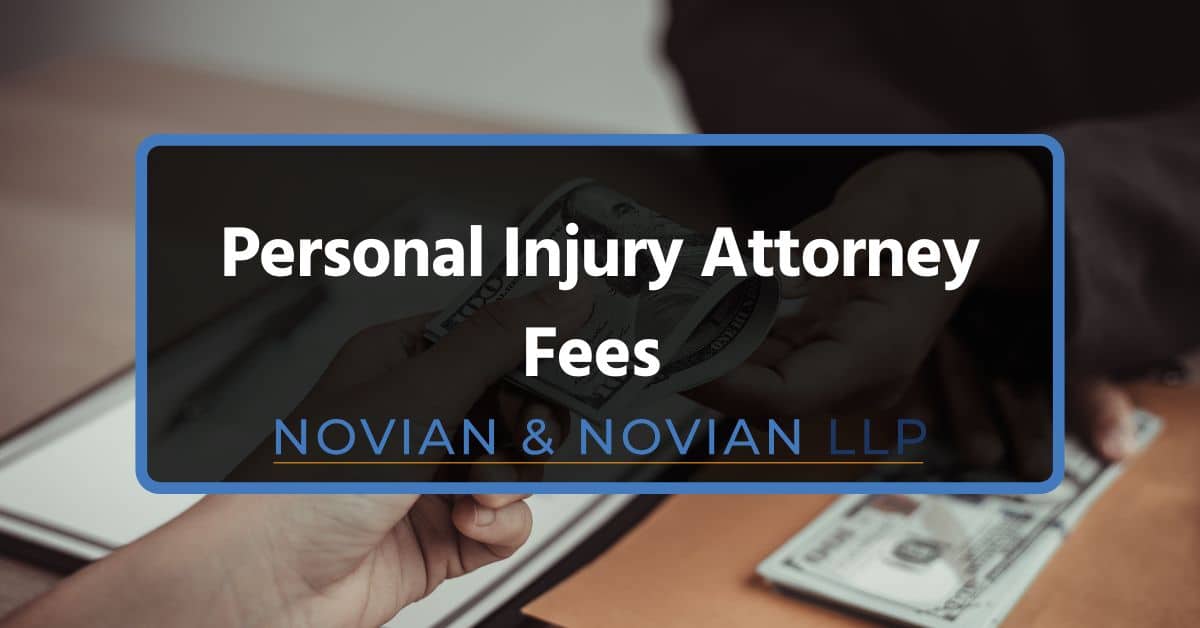Personal injury cases cover a wide range of scenarios, from car accidents and workplace injuries to slip and fall incidents. However, fees for these cases can vary significantly depending on the complexity of the case, the lawyer’s experience, and the fee structure.
When seeking a personal injury attorney, it is natural to wonder, “How much will this cost me?” Attorney fees are commonly structured in different ways, including contingency fees, hourly rates, or flat fees. Contingency fees are typical in personal injury cases, meaning you only pay if your case is successful. However, the exact percentage and additional expenses can vary from lawyer to lawyer. This is why it is important to understand what is included in your agreement.
At Novian & Novian, we have expert California personal injury lawyers that are readily available to assist you in your catastrophic injury and personal injury case. We typically operate on a contingency fee basis, because we have your best interest at heart. Schedule a free consultation with us to get started!
This post will cover the various types of attorney fees and what can influence a personal injury attorney’s fee. It will also cover the pros and cons of the various fee structures.
Table Of Contents
What Are Personal Injury Attorney Fees in Different Types of Cases?
When dealing with a personal injury, knowing what attorney fees to expect can make the legal process smoother and more predictable. In our experience, California personal injury lawyers primarily rely on contingency fee arrangements, but certain cases may involve hourly billing, flat fees, or even a retainer agreement. It depends on the type of case, the complexity of the legal issues, and the level of risk involved.
Most personal injury attorneys in California operate on a contingency fee basis, which means they only receive payment if they successfully secure compensation for you. Instead of paying upfront legal fees, the attorney takes a percentage of your settlement or verdict.
We’ve found this structure is especially helpful for accident victims facing mounting medical bills, lost income, and other financial pressures. It shifts much of the financial risk away from you and onto the law firm.
However, keep in mind that fee arrangements can vary, and you should always receive a written fee agreement that clearly explains the percentage charged, how the costs are handled, and when fees increase (for example, if a lawsuit is filed). Make sure to read the fee agreement carefully before signing.
California generally does not cap contingency fees for most personal injury cases. However, medical malpractice cases are an important exception and governed by the Medical Injury Compensation Reform Act (MICRA).
Under the California Business and Professions Code Section 6146, contingency fees in medical malpractice claims are limited by a sliding scale that caps attorney’s fees based on the amount recovered. This rule aims to safeguard injured patients while enabling attorneys to handle intricate malpractice cases.
In plain terms, the larger the recovery, the lower the percentage an attorney may charge. This cap applies only to medical malpractice, not to car accidents, slip and falls, or wrongful death claims. We recommend confirming with your lawyer whether your case falls under any special fee rule.
Generally, Attorney fees may change based on:
- Whether a lawsuit is filed (pre-litigation vs. litigation)
- Case complexity (multiple defendants, disputed liability, catastrophic injuries)
- Type of case (medical malpractice, wrongful death, product liability)
- Risk level (uncertain liability or damages)
For instance, if your personal injury claim settles quickly after submitting medical records and police reports, your fee percentage may be lower. However, if your attorney must file court documents, conduct depositions, and go to trial, your fee percentage may likely increase.
What Can Influence a Personal Injury Lawyer’s Fees?
One of the main factors influencing fees in personal injury cases is the complexity of the case. Personal injury cases can range from straightforward car accidents to intricate medical malpractice claims. Complex cases generally require more time and resources. These resources could include expert witness fees and court filing fees. As a result, a complicated personal injury case will likely incur higher attorney fees due to the additional hours and services rendered.
Another factor that determines the attorney’s fee is the attorney’s experience and reputation. An attorney’s level of experience and reputation can significantly impact their fees. More experienced personal injury attorneys with a successful track record often charge higher rates. Their expertise may result in better negotiation skills, which can lead to a fair settlement or higher court award. Therefore, while hiring an experienced lawyer may be more costly, it could also mean a higher chance of achieving the desired outcome in your personal injury matter.
The geographic location also affects the attorney’s fees. Typically, personal injury lawyer fees vary by geographic location due to differences in cost of living and market demand. For example, a personal injury attorney in a high-cost area like Los Angeles or New York may charge more than one in a smaller town. Typical attorney fees for personal injury cases may also reflect local legal practices, as some states have specific regulations that affect fee arrangements or contingency fee percentages. For example, contingency fees in major metropolitan areas often start at 35%, while smaller cities may have lower average percentages.
Furthermore, the potential settlement size affects the fees. In cases where the potential settlement is high, personal injury lawyers may charge a higher contingency fee percentage. This is because cases with large settlements often involve greater complexity, requiring more extensive legal representation. Attorneys may also charge higher fees to account for the increased risk they take on a contingency fee basis.
Contingency Fees
Contingency fees are a common arrangement in personal injury cases, allowing clients to pay only if their attorney successfully recovers compensation. Rather than charging upfront, the attorney receives a percentage of the final settlement or court award. This arrangement minimizes out-of-pocket expenses and aligns the attorney’s payment with the case outcome.
Contingency fee agreements typically range between 30% and 40%, depending on the case complexity, the attorney’s experience, and the industry standards in that region. This fee structure is crucial in personal injury cases, as it makes legal services accessible to accident victims who may be facing medical bills, lost wages, and other financial burdens.
A contingency fee agreement is most commonly used in cases involving auto accidents, slip-and-fall injuries, and medical malpractice. For instance, a slip-and-fall injury case may involve both contingency fees and various costs for medical records, witness fees, and court filing fees, which are generally deducted from the final settlement.
With a contingency fee agreement, there are no upfront costs, and it aligns with the client’s interests. This structure also allows people who may not otherwise afford legal fees to access quality representation, especially in complex cases requiring substantial resources.
However, since contingency fees typically range between 30% and 40%, they can take a significant portion of the settlement. Furthermore, lawyers on a contingency fee may be more selective, choosing cases with a higher likelihood of success or a substantial settlement amount.
We once worked with an accident victim who initially hesitated to hire a lawyer because they feared upfront costs. Upon discovering that we would handle the case on a contingency fee basis, the accident victim proceeded. The case reached a settlement of six figures, requiring them to make no out-of-pocket payments until they secured the settlement. That decision allowed them to focus on recovery instead of finances.
Hourly Fees
While less common in personal injury claims, some cases warrant an hourly fee arrangement. In this setup, the attorney charges by the hour for work completed, with typical rates ranging from $100 to $500 or more, depending on the attorney’s experience and the case location. Hourly fees are often applied in more complex or time-consuming cases that involve extensive legal research or expert witness fees.
Hourly fees may apply in complex medical malpractice claims or class-action lawsuits where extensive litigation is required. In such cases, clients pay not only the attorney’s fees but may also be responsible for court costs, filing fees, and other expenses.
With an hourly fee agreement, clients only pay for the actual time the attorney spends on their case, making this arrangement suitable for cases requiring limited legal work. Additionally, for cases that don’t require lengthy litigation, hourly fees can be more economical than other fee structures. In cases where the outcome is uncertain, paying hourly may prevent the attorney from taking a large percentage of a potential high settlement.
On the other hand, hourly fees can become expensive quickly, especially for cases involving extensive research, document preparation, and court appearances. It also causes financial strain as clients are responsible for paying regardless of the outcome. This situation can be challenging if they don’t win compensation.
Flat Fees
Flat fees provide a fixed cost for legal services, covering all or part of the legal representation. This fee structure is generally reserved for simpler personal injury cases or non-litigation matters where the scope of work is straightforward.
Flat fees are more commonly seen in personal injury cases that require limited legal intervention, such as simple claim filings or cases where the attorney’s role is primarily to negotiate with insurance companies rather than represent the client in court.
This structure is well-suited for straightforward cases or legal tasks where the attorney’s involvement is limited, such as filing paperwork or handling basic negotiations. Unlike contingency fees, a flat fee isn’t based on the case’s settlement amount, so clients retain the full award.
However, there is limited scope, as flat fees generally cover only specific services. This may mean additional fees for unexpected developments or further legal representation. Furthermore, flat fees may not be ideal for complex or unpredictable cases, such as contested liability or high-stake lawsuits.
Retainer Fees
A retainer fee is a deposit paid upfront to secure an attorney’s services and ensure that they are available for the duration of the case. As expenses arise, the attorney can draw from this retainer, and clients may need to replenish it if the balance runs low.
For ongoing or complex legal matters, particularly those requiring significant court involvement or expert testimony, retainer fees are often necessary. Personal injury cases that may require extensive legal support, such as catastrophic injuries involving ongoing medical treatment, may involve a retainer fee to cover preliminary expenses.
Common Personal Injury Fee Structures in California
The table below breaks down the most common personal injury fee structures in California, what they mean in practical terms, and the pros and cons of each so you can make a more informed decision before signing any fee agreement:




